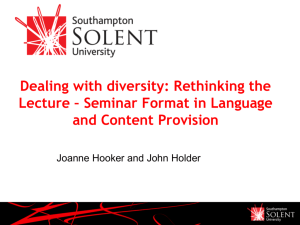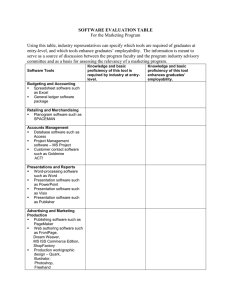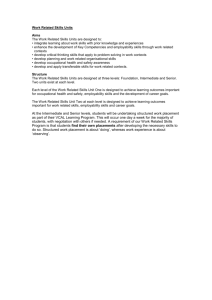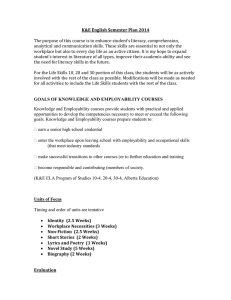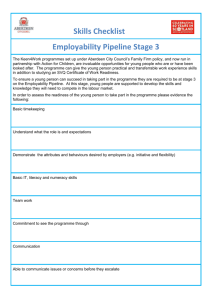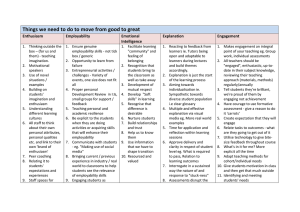Document 14106115
advertisement
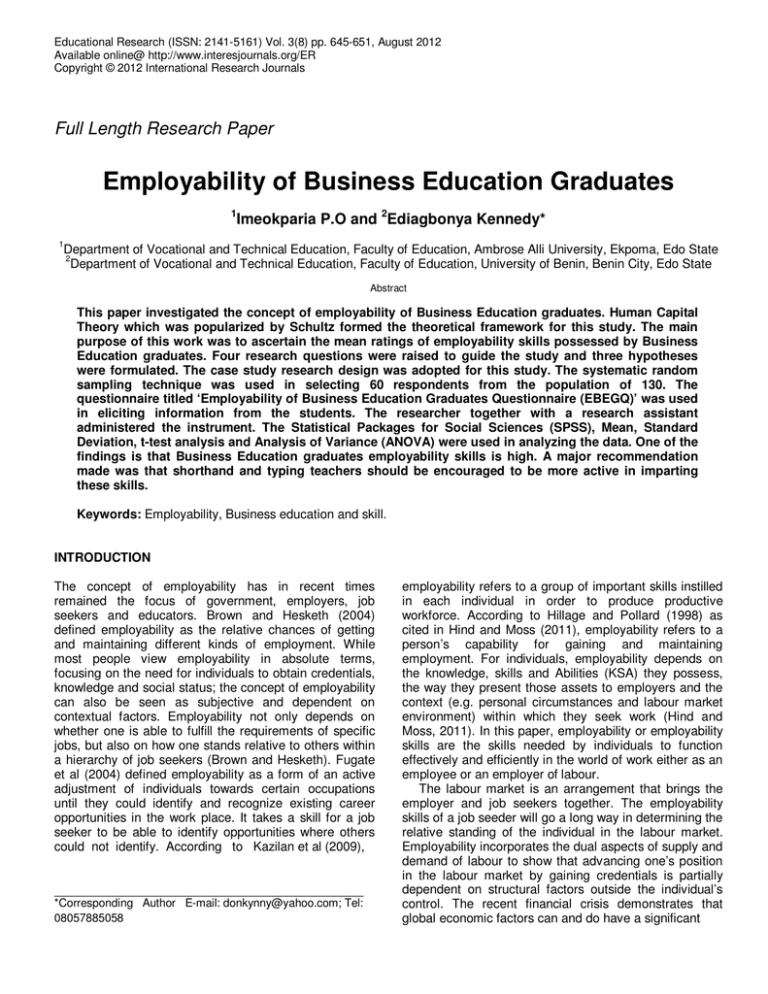
Educational Research (ISSN: 2141-5161) Vol. 3(8) pp. 645-651, August 2012 Available online@ http://www.interesjournals.org/ER Copyright © 2012 International Research Journals Full Length Research Paper Employability of Business Education Graduates 1 Imeokparia P.O and 2Ediagbonya Kennedy* 1 Department of Vocational and Technical Education, Faculty of Education, Ambrose Alli University, Ekpoma, Edo State 2 Department of Vocational and Technical Education, Faculty of Education, University of Benin, Benin City, Edo State Abstract This paper investigated the concept of employability of Business Education graduates. Human Capital Theory which was popularized by Schultz formed the theoretical framework for this study. The main purpose of this work was to ascertain the mean ratings of employability skills possessed by Business Education graduates. Four research questions were raised to guide the study and three hypotheses were formulated. The case study research design was adopted for this study. The systematic random sampling technique was used in selecting 60 respondents from the population of 130. The questionnaire titled ‘Employability of Business Education Graduates Questionnaire (EBEGQ)’ was used in eliciting information from the students. The researcher together with a research assistant administered the instrument. The Statistical Packages for Social Sciences (SPSS), Mean, Standard Deviation, t-test analysis and Analysis of Variance (ANOVA) were used in analyzing the data. One of the findings is that Business Education graduates employability skills is high. A major recommendation made was that shorthand and typing teachers should be encouraged to be more active in imparting these skills. Keywords: Employability, Business education and skill. INTRODUCTION The concept of employability has in recent times remained the focus of government, employers, job seekers and educators. Brown and Hesketh (2004) defined employability as the relative chances of getting and maintaining different kinds of employment. While most people view employability in absolute terms, focusing on the need for individuals to obtain credentials, knowledge and social status; the concept of employability can also be seen as subjective and dependent on contextual factors. Employability not only depends on whether one is able to fulfill the requirements of specific jobs, but also on how one stands relative to others within a hierarchy of job seekers (Brown and Hesketh). Fugate et al (2004) defined employability as a form of an active adjustment of individuals towards certain occupations until they could identify and recognize existing career opportunities in the work place. It takes a skill for a job seeker to be able to identify opportunities where others could not identify. According to Kazilan et al (2009), *Corresponding Author E-mail: donkynny@yahoo.com; Tel: 08057885058 employability refers to a group of important skills instilled in each individual in order to produce productive workforce. According to Hillage and Pollard (1998) as cited in Hind and Moss (2011), employability refers to a person’s capability for gaining and maintaining employment. For individuals, employability depends on the knowledge, skills and Abilities (KSA) they possess, the way they present those assets to employers and the context (e.g. personal circumstances and labour market environment) within which they seek work (Hind and Moss, 2011). In this paper, employability or employability skills are the skills needed by individuals to function effectively and efficiently in the world of work either as an employee or an employer of labour. The labour market is an arrangement that brings the employer and job seekers together. The employability skills of a job seeder will go a long way in determining the relative standing of the individual in the labour market. Employability incorporates the dual aspects of supply and demand of labour to show that advancing one’s position in the labour market by gaining credentials is partially dependent on structural factors outside the individual’s control. The recent financial crisis demonstrates that global economic factors can and do have a significant 646 Educ. Res. impact on the likelihood of an individual securing a job regardless of their skills, credentials and social status. Our financial institutions and stock exchange market are yet to recover from the crisis. The retrenchment exercises in our banks and merger of some of the banks that have heightened the unemployment rate is not unconnected with the crises. It is often believed that credential, knowledge and social status alone will guarantee a good position in the labour market. With the restructuring of the nation to a knowledge based economy, there has been a paradigm shift with more emphasis or demand for high caliber management skills. However, a focus on obtaining skills in order to gain good employment or standing in the labour market has led to an over-supply of graduates and a larger number of contenders chasing the same top jobs. The rate at with our higher institutions churn out graduates is indeed alarming without commensurate spaces for them to work. Brown and Hesketh (2004) stressed that there is a clear mismatch between individual’s expectations of employability and the realities posed by the labour market. This was what informed the classification of job seekers by Brown and Hesketh into two and they are: purist and players. The authors described the purists as those that believe in merit in getting their desired jobs because they have the requirements for the job. On the other hand, the players adopt any means possible to secure their desired jobs either by ‘hook or crook’ (that is, either legally or illegally). With the recent development in this part of the world, the players tend to thrive owing to the limited job opportunities. A major concern of graduates is on what constitutes employability skills. The skills possessed by graduates seem to be different from what the employers want. Some employers have tried to outline some of these skills they want from job seekers. In a bid to creating harmony in their skills, the Secretary Commission on Achieving Necessary Skills (SCANS) prepared reports on ways of assisting educational institutions and schools in producing younger generations who are willing to work. The report outlines both ‘fundamental skills’ and ‘workplace competencies’ to include: basic, thinking, personal qualities, resources, interpersonal, information, systems technology skills (SCANS, 1991; 2001). The above skills are no doubt invaluable to Business Education graduates. Uwameiye (1992) as cited in Imeokparia and Ediagbonya (2009) defined Business Education as the development of appropriate knowledge, skills, attitudes and understanding required to fit into chosen occupation or occupations. There are certain skills that are particular to Business Education graduates. For instance, secretarial and accounting skills remain as relevant as ever before. Though dynamism in the educational system and world of work have informed innovations in the field. The extent or degree to which Business Educator possesses these skills determines his/her relevance in the world work. Statement of Research Problem There is no gain-saying the fact that in recent times, there have been unprecedented outcry and complaints from both educated and non-educated alike as to the suitability of our graduates in job placement. The executive Secretary of National University Commission has said that the lack of regular study to advise Nigeria University system on the graduate needs of the labour market has led to a mismatch in the country that needs to be urgently addressed. The result of this according to him is that the quality and focus of the training offered by the universities are not in tune with the needs of the society and has led to high unemployment as many graduates are trained with skills that are not directly relevant to the needs of the labour market, thus perceived not to be employable (http: //nationonline.net/education/27002.html). The poor level of skills of Nigerian workers thereby leading to low productivity was what informed the establishment of Industrial Training Fund (ITF) in 1971. The mindset behind the establishment of this agency was to bridge the gap between theory and practice. The Student Industrial Works Experience Scheme (SIWES) which is an “offshoot” of ITF came up in 1973 and has been trying in this regard because students in skill or practical oriented courses in universities are met to spend some time undergoing trainings in industries related to their fields and those in polytechnics monotechnics and colleges of education are not left out; but the complaints seem not to have changed. The Nigerian Institute of Management (NIM) has been in partnership with the National Youth Service Corps (NYSC) to ensure that fresh graduates are fully equipped with the needed Knowledge, Attitude and Skills (KAS) needed to function effectively and efficiently in the world of work. Despite all these, the complaints are still there. Olaleye (2009) noted that the various Federal Government programmes on eradication of poverty have failed because graduates of the education system lack the practical skills which can be acquired through Entrepreneurship Education Programme. On August 15, 2011, the Group Managing Director of the Nigerian National Petroleum Corporation (NNPC) – Austen Oniwon reported that eighty percent (80%) of job seekers failed the corporation’s recruitment test (www.thenationonline.ng.net/2011/index). The implication of the report was that those job seekers did not possess the employability skills that NNPC needed despite their paper qualifications of a minimum of second class upper (2:1). It is in view of this that this paper is designed to ascertain the true state of things empirically and not relying on speculations as to the employability of Business Education graduates. Imeokparia and Ediagbonya 647 ………………………………………………………………………………….. 1 Education and Training Resource/Inputs Outcome Production Processes Earnings /Output Resources/Inputs Citizenship Processes Efficiency/Output Efficacy/Output ……………………………………………………… 2 2 33 Figure 1. A Model of Human Capital Theory (Swanson, 2001: 110) Theoretical Framework The theoretical framework of this study can best be explained by the Human Capital Theory. This is the most influential economic theory of Western Education (www.ffst.hr/ENCLOPAEDIA/doku.php). This theory was popularized by T.W Schultz a Nobel Laureate Prize winner. According to Schultz (1963), human capital is a theory which displayed the role of investment in education in order to boost economic and social achievement. Human capital theory equally suggests that education or training raised the productivity of workers by imparting useful life skills on the individuals. Becker (1993) noted that the most valuable of all capital is that investment in human being. Becker distinguishes firmspecific human capitals from general-purpose human capital. Examples of firm-specific human capital include expertise obtained through education and training in Management Information Systems (MIS), accounting procedures, or other expertise specific to a particular firm. General-purpose human capital is knowledge gained through education and training in areas of value to a variety of firms such as generic skills in human resource development. Regardless of the application, Becker considers education and training to be the most important investment in human capital. Becker (1962; 1964) believed that the height of workforce production have positive relationship with the educational and training form in which the higher the educational and training form a person gets, the higher the productivity/achievement of an individual. According to Lange and Topel (2004), a person with great skills will be able to increase employers or the workplace productivity. It is believed that by virtue of this theoretical framework, business education students need possess employability skills that will enable them to function effectively and efficiently in the workplace. Figure 1. Presents the key relations in human capital theory and the assumptions underlying these relationships. Relationship 1 represents the concept of production functions as applied to education and training. The key assumption underlying this relationship is that investment in education and training results in increased learning. Relationship 2 represents the human capital relationship between learning and increased productivity. The key assumption underlying this relation is that increased learning does, in fact, result in increased productivity. Relationship 3 represents the human capital relationship between increased productivity and increased wages and business earnings. The key assumption underlying this relationship is that greater productivity does, in fact, result in higher wages for individuals and earnings for businesses. As per conclusion, human capital does contribute to the organizational advantages and profits. The entire human capital continuum represented is assessed using return-on-investment analysis or costbenefit analysis. The human capital theory is an important agent for boosting firm performance. Purpose of the Study The following purposes will guide this study: i. To find out the level of employability skills in terms of the aspects of basic skills, thinking, resource, information, interpersonal, system/technology and personal quality. ii. To ascertain the differences between employability skills with sex. iii. To ascertain the differences between employability skill 648 Educ. Res. iv. and field of study. v. To ascertain the differences among aspects of employability skills. Research Questions This research work has been designed to answer the following questions: I. What is the level of employability skills in terms of the aspects of basic, thinking, resource, information, interpersonal, system/technology, personal quality, secretarial and accounting skills?. II. Is there a significant difference between aspects of employability skill with sex? III. Is there a significant difference between employability skill and field of study? IV. Is there a significant difference among aspects of employability skills? HYPOTHESES The following hypotheses have been formulated to guide this study: Ho1: There is no significant difference between aspects of employability skill with sex. Ho2: There is no significant difference between employability skill and field of study. Ho3: There is no significant difference among aspects of employability skills. Scope of the Study The geographical scope of the study covers Edo state (That is, University of Benin) while the content scope covers the following variables: university, students, sex and skills. Significance of the Study The findings of this research work will no doubt be of great importance to all stakeholders among which are: Government: The findings of this work will better inform the government on how to plan for the graduates in the country and to equally put the necessary machinery in place geared at repositioning the educational system to be more responsive to the needs of the society. Researchers: This study will provide a framework for subsequent studies in this area and it will serve as reference work for researchers who intend to do similar study. Students: The students who are major stakeholders will find this work very useful as they prepare for the world of work. It will equally serve as “eye opener” to business students/graduates who are not informed about the skills they are suppose to possess. It will also form vital part of the students’ course materials or reference materials. Employers: The findings of this work will be of great importance to employers as it will afford them the opportunity to know the areas of weaknesses of our graduates and how to possibly organize a training programme to address this challenge. General Public: The general public who intend to broaden their horizon as regards employability will definitely find this study a priceless companion. This will enable the public to be exposed to the nitty-gritty in employability. METHOD OF THE STUDY Design of the Study: The case study research design was adopted for this study. This design was adopted because the researcher is interested in the accurate assessment of the characteristics of the whole population of Business education graduates currently on the masters’ programme in Business education. Population The population for this study is 130 business education graduates that are from the different higher institutions currently in M Ed programme in UNIBEN. Sample and Sampling Technique: The sample for this study is 60. The systematic random sampling technique was adopted in drawing the sample from 2009/2010 and 2010/2011 academic session. The size is approximately 46% of the population. Research Instrument The questionnaire was adapted from SCANS in eliciting data from the respondents. It was titled “EMPLOYABILITY OF BUSINESS EDUCATION GRADUATES QUESTIONNAIRE (EBEGQ)”. It was divided into two sections (A and B). Section A comprises of demographic variables while section B comprises of opinion statements structured in 4-point rating. That is, Very High (VH), High (H), Low (L) and Very Low (VL). Validity and Reliability of Research Instrument The instrument was given to two (2) experts in Business Education and one expert in measurement and evaluation and they made necessary inputs to the instrument. The test – retest method of reliability was adopted. The instrument was initially administered to 20 graduates of Imeokparia and Ediagbonya 649 Table 1. Mean and Standard Deviation for Aspects of Employability Skills Aspects of Employability Skills Basic Skills Thinking Skills Resource and Capability Skills Information Skills Interpersonal Skills Systems/Technology Skills Personal Quality Skills Secretarial Skills Accounting Skills Aggregate Mean 3.36 3.31 3.37 3.20 3.34 3.05 3.49 2.64 2.69 3.16 Standard Deviation (SD) 0.62 0.58 0.64 0.67 0.61 0.72 0.57 0.75 0.82 0.66 Decision High High High High High High High High High High Source: Author’s Fieldwork Table 2. Examination of Employability with Respect to Sex Variable 1 2 N 48 48 Mean 90.1250 1.9225E2 Source: author’s fieldwork Standard Deviation 8.47430 10.51544 Df 94 Sig. (2-tailed) 0.000 Decision significant P < 0.01 Business Education which was not actually part of the sample. It was later re-administered to them after an interval of two (2) weeks. Their responses were correlated using Pearson product moment correlation (r) and the reliability coefficient obtained was 0.79. Data Analyses The Statistical Packages for Social Sciences (SPSS) version 16.0 was used in analyzing the data. The descriptive statistics to be used include mean and standard deviation. The mean value of 2.50 was used in taking decision. A mean value of 2.50 and above was considered as high while a mean value of less than 2.50 was considered as low. The inferential statistics used was the student t test of independent samples and Analysis of Variance (ANOVA). Table 1 shows that the least mean was recorded in ‘aspects of Secretarial skills (2.64)’followed by aspects of Accounting skills (2.69) which are both component of Business Educators’ skills. The highest mean score was recorded in ‘aspects of Personal Quality Skills (3.49). The aggregate mean score is 3.16 which mean that Business Education graduates (Business Educators) have high employability skills. Hypotheses Testing Hypothesis One Ho1: There is no significant difference between aspects of employability skill with sex. Table 2 reveals that the calculated probability is 0.000. Since the calculated probability is less than 0.01, the null hypothesis (Ho) is therefore rejected which means that there is a significant difference between aspects of employability skills with sex. Data Analyses and Result Hypothesis Two This section is designed to present the data collated for ease of analysis and interpretation. Research question 1 was answered using mean and standard deviation while hypotheses 1 and 2 were answered using t-test and hypothesis three using ANOVA. Research Question 1: What is the level of employability skills in terms of the aspects of basic, thinking, resource, information, interpersonal, system/technology, personal quality, secretarial and accounting skills?. Ho2: There is no significant difference between employability skill and field of study. Table 3 reveals that the calculated probability is 0.000. Since the Calculated probability is less than 0.01 levels of significant, the null hypothesis is therefore rejected which means that there is a significant difference between Accounting Education graduates and Secretarial Education graduates as regards employability skills. 650 Educ. Res. Table 3. Examination of Employability with respect to Field of Study Variable 1 2 N 48 48 Mean 79.7917 1.1242E2 Source: author’s fieldwork Standard Deviation 7.81150 12.04925 Df 94 Sig. (2-tailed) 0.000 Decision significant P < 0.01 Table 4. Examination of Differences among the Aspects of Employability Skills Between Groups Within Groups Total Sum of Squares 22064.783 Df 7 Mean Square 3152.112 14719.883 40 367.997 36784.667 47 Source: Author’s Fieldwork Hypothesis Three Ho3: There is no significant difference among aspects of employability skills. Table 4 reveals that the calculated probability is 0.000. Since the Calculated probability is less than 0.01 levels of significant, the null hypothesis (Ho3) is therefore rejected which means that there is no significant difference among aspects of employability skills. DISCUSSION OF FINDINGS From the analysis of the data collated, it is seen that Business Education graduates employability skills is high with an aggregate 3.16 which is quite okay. Based on the findings of the study, it is revealed that the thinking skills of Business Education graduates are not as high as that of Personal Quality skill. It must be emphasized that the low aggregate mean score of Secretarial and Accounting skills is an indication that Business Education graduates are not well equipped with their ‘core skills’ and this can affect them (Imeokparia and Ediagbonya, 2009).. The finding from the first hypothesis tested reveals that there is a significant difference between employability skills with sex. This corroborates the finding of Kazilan et al (2009) who stressed that there are only significant difference between basic skills and information skills with gender. It equally supports the study done by Mitchell (2001) The finding from the second hypothesis (Ho2) reveals that there is a significant difference between employability skills and the field of study. This finding is in agreement with the findings of Kazilan et al (2009). Graduates of Business Education that majors in F 8.566 Sig (P) 0.000 Decision Significant P < 0.01 Secretarial Education (Office Technology and Management) will tend to display certain skills different from the ones that majors in Accounting Education. The finding from the analysis of the final hypothesis (Ho3) reveals that there is a significant difference in the aspects of employability skills possessed by Business Education graduates. It supports the finding of Kazilan et al (2009). CONCLUSION This paper has carefully examined the concept of employability of Business Education Graduates. Based on the findings, it can be concluded that: (i) Business Education graduates employability skills is high. (ii) There is a significant difference between employability skills with sex. (iii) There is a significant difference between employability skills and the field of study and; (iv) there is a significant difference in the aspects of employability skills possessed by Business Education graduates. It therefore implies that the current level of skills possessed by Business Education graduates is just okay for them to secure placement in the world of work. RECOMMENDATIONS Business Education graduates’ employability is a major concern of all stakeholders. Based on the findings of this study, the following recommendations are invaluable to the advancement of Business Education: i. Students and graduates should seek relevant professional trainings from recognized and registered professional bodies both within and outside the country like Nigerian Institute of Management (NIM), Institute of Chartered Secretaries and Administrators (ICSA), Institute of Chartered Accountants of Nigeria (ICAN), Imeokparia and Ediagbonya 651 Administrative Staff College of Nigeria (ASCON), and Institute of Personnel Management (IPM). ii. Government and Non Governmental Organizations (NGOs) including philanthropists should assist in providing modern infrastructural facilities and Instructional Communication and Technologies in order to ease the transmission of these skills iii. Business educators including Shorthand and typing teachers should be encouraged and motivated in order to be more productive and efficient in imparting these skills. iv. Business studies curriculum in Junior Secondary School which form the basis for Business Education in higher institutions should be reinforced (that is, making the teaching of all its components compulsory). v. Business Educators should develop techniques on how to improvise some of these teaching aids that are not available. vi. Business Education practitioners should develop modern motivational techniques to motivate their students especially shorthand and keyboarding students. vii. The co-ordinator of Students Industrial Works Experience Scheme (SIWES) should ensure that students carryout their training in industries related to their fields to ensure that they are properly supervised by both school-based supervisor and industry-based supervisor. viii. Institutions should liaise with industries around to form a kind of partnership to ease the transmission of these skills. That is, having school - industry partnership because some of these equipment/facilities are not in the schools. ix. The teaching and learning of computer in Business Education should be reinforced and the computer laboratories should be well equipped to meet modern day needs. REFERENCES Becker GS (1962). Investment in Human Capital: A Theoretical Analysis. Columbia University and National Bureau of Economic Res. J. Political Economy, 5, 9-49. Becker GS (1964). Human Capital. A Theoretical and Empirical Analysis with Special Reference to Education. Columbia University. New York: National Bureau of Economic Research. Becker GS (1993). Human Capital: A Theoretical and Empirical Analysis with Special Reference to Education (3rd ed.).Chicago: University of Chicago Press. Brown P, Hesketh A (2004). The Mismanagement of Talent: Employability and Jobs in the Knowledge Economy. Oxford: Oxford University Press. Fugate M, Knincki AJ, Ashforth BE (2004). Employability: A psychosocial Construct, Its Dimension, and Applications. J Vocational Behaviour, 65, 14-38. Imeokparia PO, Ediagbonya K (2009). Utilization of Teaching Aids in Teaching and Learning of Business Education in Ambrose Alli University, Ekpoma, Edo State. Multidisciplinary J. Intellectualism:2(2):12-15. Kazilan F, Hamzah R, Bakar AR (2009). Employability Skills Among the Students of Technical and Vocational Training Centers in Malaysia. European J. Social Sciences, 9(1):147-160. Lange F, Topel R (2004). The Social Value of Education and Human Capital. Retrieved from http://www.econ.yale.edu/~fl88/Handbook_Chapter.pdf Mitchell ML (2001). Importance of Workplace Skills Needs for EntryLevel Employment as Perceived by Secondary Vocational Students and Employers. Thesis, Doctor of Education Graduate School of Wayne State University, Detroit, Michigan. Olaleye FO (2010). Entrepreneurship Education in Tertiary Institutions in Nigeria, Implication for Millennium Development Goals (MDGs). J. Education and Leadership Development, 2, 29-33. Retrieved from www.cenresinpub.org. Robinson JP (2000) What are Employability Skills? Alabama Cooperative Extension System. SCANS (1991). What Work Requires of Schools. A Secretary’s Commission on Achieving Necessary Skills (SCANS), Report for America 2000. U.S Department of Labour. SCANS (2001). About SCANS. Baltimore, Maryland: SCANS2000 Center.Johns Hopkins University. Schultz TW (1963). The Economic Value of Education. New York and London: Columbia University. Swanson RA, Holton EF (2001). Foundations of Human Resource Development. San Franciso: Berrett-Koehler. Zirkle C (1998). Perceptions of Vocational Educators and Human Resource/Training and Development Professionals Regarding Skill Dimensions of School-toWork Transition Programs. J. Vocational and Technical Education, 15, 1-20.
